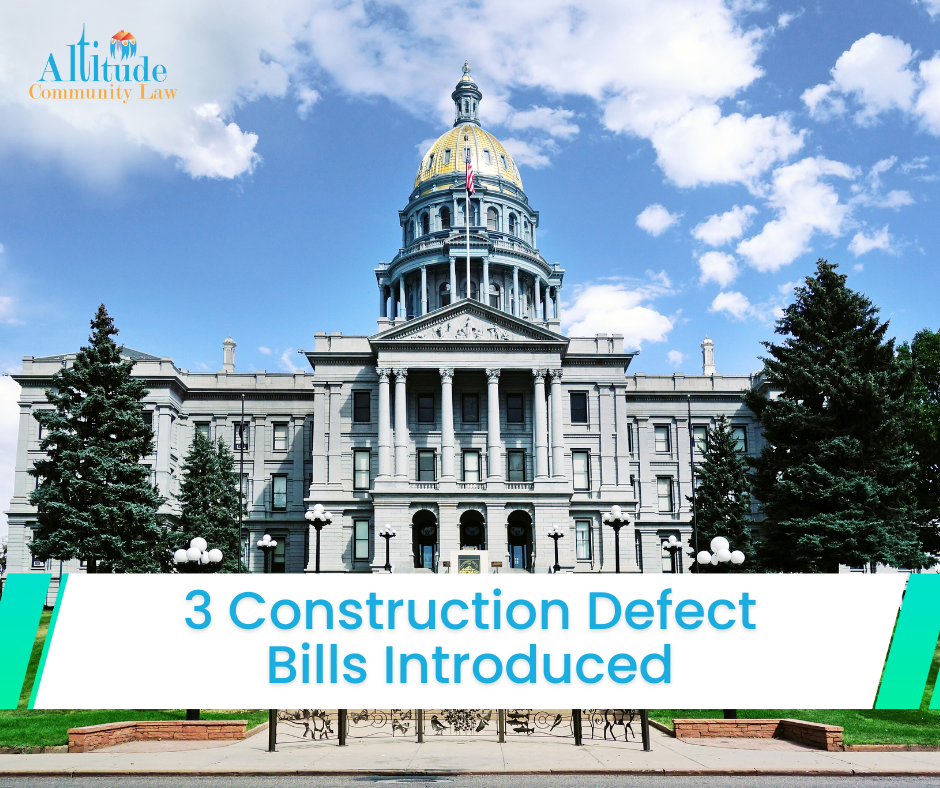
The number of laws proposed during the 2024 legislative season that affect the rights and responsibilities of homeowners associations leaves board members spoiled for choice as to which of the mounting problems or crises their associations face in the coming year they will be investing their emotional wherewithal. In an effort to alleviate the pains already being felt by many in the state caused by the current cost-of-housing crisis, the Colorado Legislature has introduced three bills aimed at bringing down the cost of construction defect lawsuits by making them harder to bring by an association, provide for mandatory alternative dispute resolution, and limit damages a claimant can seek. Let’s pop the hood on SB24-106, SB24-112, and HB24-1230 and take a look at some of the highlights.
Current law provides that an association may institute, defend, or intervene in litigation in its own name on behalf of itself or two or more unit owners on matters affecting the common interest community. SB24-106, if passed, would limit an association’s ability to bring a construction defect action, unless the claim concerns real estate, that is owned by the association or by all members of the association. If the association makes a claim on behalf of two or more unit owners when the claim does not concern real estate owned by the association, then each claim the association brought on behalf of the owners will be subject to each defense limitation and procedure that an individual owner would be subject to in pursuing their own claim.
The act would also require that a builder be given the opportunity to fix any construction defect before a claim could be brought or lawsuit could be filed. If the work is diligently performed by the builder, regardless of whether the work actually fixed the underlying problem or not, the claimant will have been deemed to have settled the matter and will be limited to claims regarding the remedial work only. This means that if there is a construction defect and the builder attempts to remedy that defect, a unit owner or association will only be able to bring a claim for damages resulting from the improper performance of remedial work.
The act further requires an association to obtain the written consent of at least two-thirds of actual owners’ units within an association in order to bring a construction defect claim. The written consent must be signed by each owner, must include an affidavit from each owner verifying that each claimed defect exists in the unit owner’s home and that the unit owner has been informed of the unit owners’ duty to disclose.
SB24-112 expands on that last thought. Typically, the votes of non-responsive owners would not be included in any totals affecting the two thirds threshold, unless challenged in court. SB24-112 would require the association to send a list of all unit owners that were non-responsive to the builder. If the builder challenges that those homeowners were non-responsive; the court will then look at how hard the association attempted to get the vote of a member by determining whether mail was returned undeliverable, whether an owner appears to be residing in a unit, and whether the association had attempted to email or call the owner of a property. If a court found the association did not try hard enough to get the vote of a non-responsive owner, the court could order the association to perform the entire notification and voting process in order to bring an action again.
Under this bill, a representative of the association will be required to provide to the court and the builder any and all information that will be relevant to the court’s determination within 21 days after the challenge has been brought by the builder.
Lastly, HB24-1230 would void any section in a declaration or other governing document that limits any property owners right to bring a claim against a construction professional and would require an association to fully comply with the disclosure and approval requirements provided in the Colorado Common Interest Ownership Act regardless of anything to the contrary in an association’s declaration.
These bills, if passed as currently written, would apply to construction defect claims and legal actions on or after October 1, 2024.
We will keep you up to date on this bill through our 2024 Legislative Tracker.
If you have any questions about these bills, please contact one of our Altitude attorneys at 303-432-9999 or email us at [email protected].